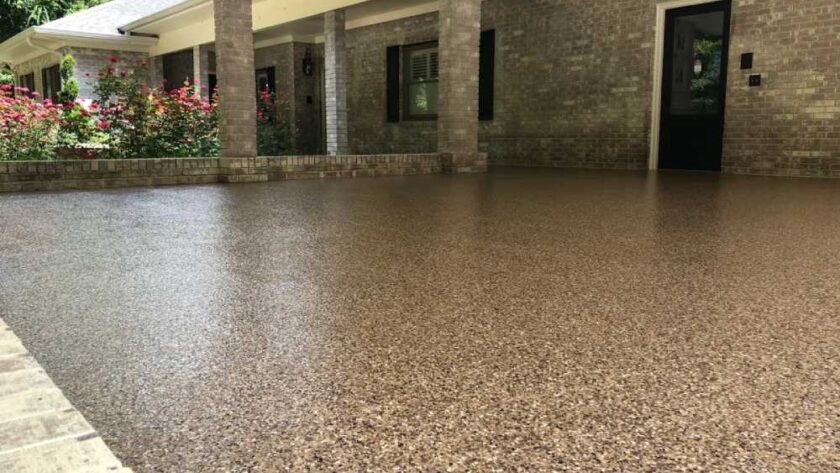Regarding garage flooring, homeowners have many options, offering unique features and advantages. Common choices include sturdy epoxy coatings, versatile interlocking tiles, and aesthetically pleasing concrete stains.
Epoxy coatings remain popular due to their high durability and stain resistance, making them ideal for spaces that endure heavy use. Many homeowners in the area have chosen epoxy garage floors in Middlesex County for their superior quality and finish.
Additionally, interlocking tiles offer ease of installation and replacement, making them a favorite for DIY enthusiasts looking for a quick and functional upgrade. Concrete stains offer various color options and a more personalized touch, though they may demand higher maintenance over time.
Contents
Benefits and Drawbacks of Popular Choices
Understanding the pros and cons of each garage flooring option is crucial. Epoxy coatings, for example, are greatly acclaimed for their remarkable stain, chemical, and oil resistance and extraordinary durability. These coatings not only enhance the look of the garage but also protect the underlying concrete from cracks and damage.
However, one drawback is that epoxy floors can become slippery when wet, posing a potential safety hazard. Another point to consider is that the installation of epoxy coatings often requires professional help due to its complex and time-consuming application process.
Interlocking tiles, on the other hand, are known for their user-friendly installation process. If damaged, these tiles can be easily replaced and come in various styles and colors to match your interior design. However, they may need to provide the seamless look that some homeowners desire. Furthermore, dirt and debris can sometimes get trapped in the seams between the tiles, necessitating more diligent cleaning.
Concrete stains allow for a wide range of customization options, allowing homeowners to create unique patterns and colors on their garage floors. They are also relatively inexpensive compared to other flooring options.
However, concrete-stained floors may require more maintenance, including regular sealing, to maintain their appearance. Though each alternative has unique benefits and drawbacks, your final decision should be based on your own requirements and situation.
Maintenance Tips for Garage Floors
Maintaining your garage floor is crucial to ensuring its longevity and keeping it looking pristine. Routine cleaning is necessary for all types of flooring to avoid the accumulation of debris, filth, and possible stains.
For instance, finding epoxy flooring near me benefits from frequent sweeping and washing with a pH-neutral cleaner to avoid damaging the coating. Additionally, addressing spills immediately can prevent stains from falling and becoming more challenging to remove.
Concrete-stained floors require periodic sealing to maintain their color and finish. Depending on usage and exposure to the environment, it’s recommended to reseal the floor every few years. Meanwhile, interlocking tiles should be regularly cleaned to prevent dirt from accumulating in the seams. These floors may be kept looking brand new by using a vacuum or a light cleaning solution.
These manuals provide helpful guidance on how to maintain your garage floor in the best possible state so that it will continue to be strong and visually appealing for many years to come.
Understanding the Installation Process
The installation process for garage flooring varies significantly depending on the type of material chosen. Epoxy coatings typically require professional installation due to the intricate steps involved, including surface preparation, mixing the epoxy, and applying multiple layers.
The process usually starts with cleaning the concrete surface thoroughly and repairing any cracks or holes. Then, a primer layer is applied, followed by one or more coats of epoxy resin. Each coat must cure completely before the next is applied, which can take several days.
In contrast, interlocking tiles can be a straightforward DIY project. These tiles have interlocking edges that snap together, making installation relatively simple. Before laying the tiles, cleaning the garage floor and ensuring it’s dry and free from debris is essential. Once the tiles are laid out, they can be cut to fit around obstacles such as pillars or walls using a utility knife or a power saw.
Concrete stains involve a mix of manual and chemical application processes. The concrete must be thoroughly cleaned and etched to open the pores for better stain absorption. The stain is then sprayed or applied with a brush, and the floor must dry completely before applying a sealer. Proper preparation and execution are crucial for each installation type, so it is advisable to follow the manufacturer’s guidelines or hire a professional when necessary.
Cost Considerations
Cost is a significant factor when selecting the right garage flooring. Prices can vary widely depending on the material type, quality, and size of the garage. Epoxy coatings often have a higher upfront cost due to the complexity of the process and the materials of the materials. However, their durability and low maintenance requirements can result in long-term savings, making them a worthwhile investment for many homeowners.
Interlocking tiles offer a more budget-friendly initial cost, and their DIY-friendly installation can save on labor expenses. However, these tiles might need more frequent replacements, especially in high-traffic areas, which can add to long-term costs. Furthermore, choosing higher-quality or aesthetically pleasing tiles can increase the overall expense.
Concrete stains are generally less expensive in terms of materials and application, making them an attractive option for budget-conscious homeowners. However, periodic resealing and maintenance can increase the overall lifetime cost. Having a clear budget and understanding the long-term expenses of each flooring type can help you make the best financial decision for your home.
Final Tips for Choosing Garage Flooring
In conclusion, selecting the right garage flooring involves weighing multiple factors, including material type, benefits and drawbacks, maintenance needs, installation processes, and costs. By carefully considering these elements, you can choose a flooring option that meets both your functional needs and aesthetic preferences.
For example, if durability and low maintenance are your top priorities, investing in high-quality epoxy coatings could be the best choice. Alternatively, interlocking tiles might be the way to go if you prefer a more customizable and DIY-friendly option.
Remember to rely on trusted sources and expert advice to make the most informed decision possible. Your garage floor is an integral part of your home, and investing in the right solution will ensure it remains durable and visually appealing for years to come. Whether you consult professional installers or do thorough research online, selecting the best garage flooring will pay off in the long run.




